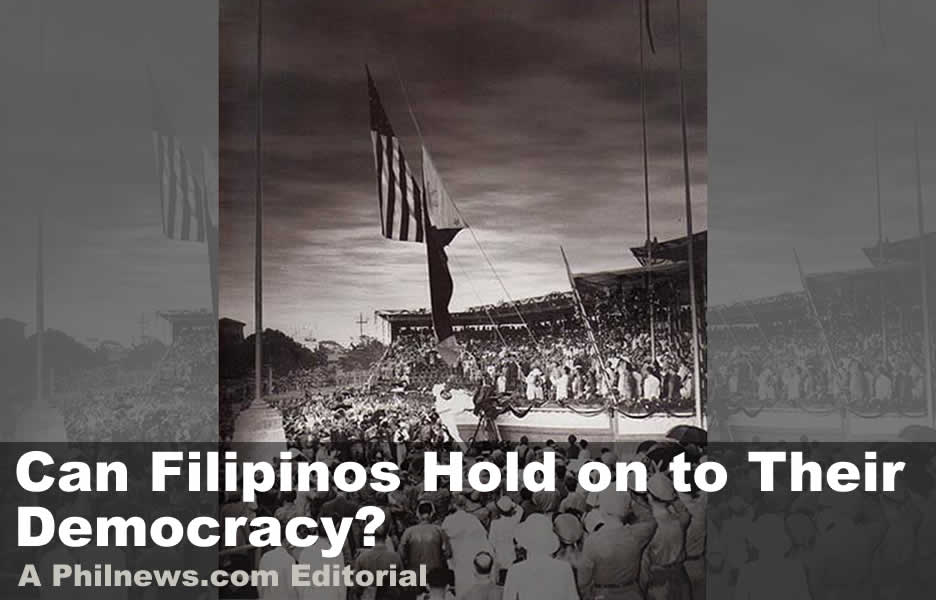 July 4, 1946 festivities at the Independence Grandstand in Luneta. Photo: ffemagazine.com
July 4, 1946 festivities at the Independence Grandstand in Luneta. Photo: ffemagazine.com

fter Spain ceded the Philippines, Guam, and Puerto Rico, to the United States in 1898, President William McKinley "envisioned the Philippines as an American protectorate or an American colony," according to archives of the U.S. House of Representatives. "Like many people on the mainland, he [McKinley] believed Filipinos were incapable of self-government and did not want another foreign power to take over the islands."
Notwithstanding that initial assessment, American sentiment gradually warmed to the idea of Filipinos eventually governing themselves. And Filipinos subsequently lobbied hard for the passage of the Tydings–McDuffie Act, which created a transitional commonwealth administration and set The Philippines down the path to full independence in a decade.
The form of government Filipinos got closely resembled America's. It came with inherent strengths, but, as described below, also inherent weaknesses.
America's founding fathers made their government intentionally complicated. There is a delicate balancing act between its executive, legislative, and judiciary branches. Each branch serves as a check on the other two. But despite that inherently adversarial relationship, individuals within a branch must work with their counterparts from the other branches for the government to function.
To make matters worse for Filipinos, World War II and the Japanese occupation deprived them of their full 10-year transition period outlined by the Tydings–McDuffie Act. Nevertheless, Filipinos welcomed democracy and self-governance with open arms on July 4, 1946, determined to do their best with the hand they were dealt. And for the next two decades, They enjoyed significant successes. A post-war Philippines led Southeast Asia and even served as a model to other developing countries.
But the going was far from easy. The late Senator Raul Manglapus, in 1960, underscored the difficulty of elections in the country. Writing in Foreign Affairs magazine, Manglapus noted that "the process of elections in the Philippines is the most difficult in the world. The reason for this is to be found in a unique combination of things--a territory more challenging and a political system more demanding than those of any other working democracy today."
Twelve years after that article appeared, the Philippines was under martial law. Ferdinand Marcos, the president-turned prime minister-turned dictator, would rule with an iron fist for 14 years.
Those years further stunted the growth of democratic ideals in Filipino society. It also prevented Filipino public officials from honing their craft. During the martial law years, Marcos and his cronies made the major decisions. The public had no say.
Although the Marcos regime was eventually toppled in 1986 by the People Power revolution, the damage it caused ran deep. It tore the social fabric of Philippine society, and Filipinos were never fully mended back again.
All this brings us to where we are today. Thirty-four years since the end of the Marcos dictatorship, a new generation of Filipinos appear poised to again hand over the reins of government to another tough-talking autocrat.
From a broader perspective, however, we see that Filipinos are not the only ones moving away from liberal democracy. Many nations today are led by authoritarian rulers. Even the United States, now has a president who appears to curry favor with autocrats like Vladimir Putin of Russia, Kim Jong Un of North Korea, Recep Tayyip Erdoğan of Turkey, and Xi Jin Ping of China.
Today, democracies appear to be on the decline, and autocracies on the rise. As noted earlier, democracies are by nature complex organizations and thus impose significant demands on its citizens.
In a democracy, power lies with the people. That means a certain level of intelligence is required of its citizens. Lacking that, a democratic government will be hard-pressed to function correctly.
A current example of this is the United States. The once-heralded American exceptionalism has turned into American mediocrity, with its present government hobbled by infighting and gridlock. Individuals like Donald Trump, who—in the past—never stood a chance at elected office, can now make it to the highest offices in the land.
A similar situation appears to have happened in the Philippines. Since Martial Law, the country's "best and brightest" have been leaving for greener pastures abroad. Also, the educational level of Filipino students has steadily deteriorated. They now rank at, or near the bottom, on standardized tests.
In a Dec. 2019 article, Kristine Sabillo, of ABS-CBN News wrote, "recently, it was reported that the Philippines ranked lowest in reading comprehension among countries assessed by the Organization for Economic Cooperation and Development. It also ranked second to the last for math and science."
Until the country finds a way to raise the level of education of the average Filipino, democracy will continue to flounder in the Philippines. Just look at what is happening in the United States: education has been de-prioritized for decades, and its democratic institutions are now starting to falter. A functioning democracy can only be as good as the citizens who make it work. Or as computer programmers would note, "garbage in, garbage out."
Thus, the imperative of all democracies today should be to ensure that the vast majority of their citizens receive the best education possible. The Philippines appears to have failed at this task, but it is not too late to turn things around. We must all join hands and rescue our democracy. Imperfect as it is, once lost, we might never be able to get it back. Published 3/4/2020
|